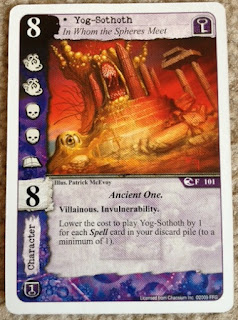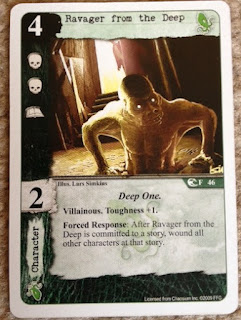Since I really enjoy Living Card Games (or LCGs), for today's review, I tracked down a copy of Call of Cthulhu: The (Living) Card Game. And, for the purposes of this review, I will be writing about the game system, but will also be focusing on the core set, to let you know how well the basic game plays without buying expansions.
In Call of Cthulhu, each player is attempting to explore various stories that they have heard about. At any given time, there will be three stories on the table that you may commit characters to investigate. Once a player accumulates five "success" tokens on a story, they immediately claim that story, and once they claim three total stories, they have won the game. However, to get to that point, players must alternate in taking turns. Each turn consists of several phases, starting with making a character sane and readying all of your other characters and resources. Then you draw two cards. After drawing cards, the active player may select a card from his hand to turn into a resource. Next, the active player can exhaust resources in order to play characters, attachments, and events. Finally, the story phase begins. In the story phase, the active player commits their characters to various stories, and then the other player may respond by committing his characters. Next, each story resolves. When resolving a story, the players have four different struggles - terror, combat, arcane, and investigation, and then the overall story is scored. Each of the first four struggles compares the corresponding icons that are located on committed characters. Whoever loses a terror struggle has a character go insane, the loser of a combat struggle has a character take a wound (and probably die), the winner of an arcane struggle gets to ready one of his committed characters, and the winner of the investigation struggle gets to place a success token on the story. Finally, with whatever characters are still alive and sane, the players compare total skill on the story. If the active player wins, he gets to place a success token - if he wins and his opponent's skill is zero or less (generally because they didn't play anyone there), then he gets to place an additional success token. Play alternates like this until one person acquires three stories.
 |
| All these do is marked your drained domains |
My first pro for the Call of Cthulhu card game is that I really like how resources work in the game. Resources are based on "domains." To start the game, you take three cards that aren't being used, and place them face down to form your starting domains. Then, you draw a setup hand of eight cards. You keep five of these cards, and you place the other three (upside down) under your starting domains. Then, each turn during your resource phase, you have the option of adding an additional card from your hand to one of these domains. When playing cards from your hand, you must be able to "drain" a single domain with at least as many cards as the cost of the card in question. Additionally, at least one of the resources must match the faction of the card being played. I really like this mechanic. First, it prevents you from having to draw specific resource cards (like Magic: The Gathering), but allows all of your cards to be dual use. Second, I like that there is an opportunity cost to gaining resources. Presumably, every card in your deck is useful (though this is more true when you build a deck than when you use a starter deck). Thus, whichever card you are using as a resource was a card that was intentionally selected to go in that deck. And, instead of getting to play it, you now bury it as a resource. I enjoyed this balance quite a bit.
 |
| Though powerful, rare to actually play |
Now, before getting into the cons, I will mention one thing that I was surprised by about Call of Cthulhu. The game is really short. I realize that this will not always be the case - it will depend on what cards you use (and draw), and the skill of the players. Yet, in all of the games that I played, I don't think any of them lasted ten turns. Many of the characters in the base set have the investigation icon, and often it seemed best to leave stories unopposed (because otherwise the character you would defend with would become insane or be killed), and thus there would be many turns in which a player would score three success tokens on a story (or even several stories) in a single turn. That many success tokens can make the game go very quickly. So, some of the really cool cards that are in your deck (like Cthulhu himself), may never get played because their resource cost is so high. One of the cards in the game costs eight resources. He does powerful things, but you would have to put all of your resource cards into a single domain for seven turns in order to play him - and the game would also have to last seven turns in order for that to happen.
 |
| Playing this greatly tips the game in your favor |
The other con that I have for Call of Cthulhu is fairly common for customizable or living card games. There is a lot of ambiguity. It would have been really helpful if the rulebook had a glossary, or at the very least an index. There are some rules that are buried in unexpected places, and with the number of different cards wording things differently, it would be nice to easily look up what an "ability" is - does this include passive abilities, or just triggered abilities? Instead of putting a glossary (or index) in the back of the rulebook, they included seven pages of advertisements for other Cthulhu products (with the back of the rulebook being an ad for The Game of Thrones living card game). As a player, I feel that this space could have been used more productively.
Overall, I give Call of Cthulhu: The Card Game an 8.0/10. I thought the game was enjoyable, and that people who love the theme could really get into this one. I was glad to get to play it, thought it wound up as my least favorite of Fantasy Flight's living card games - but that is more of a testament to how good the other games are than a knock against this one. And, since I'm only willing to invest in a few of them, I will probably pass this one along in a trade in the future.
If you are interested in living card games, make sure you check out Android: Netrunner LCG, Star Wars LCG, and Lord of the Rings LCG.

No comments:
Post a Comment